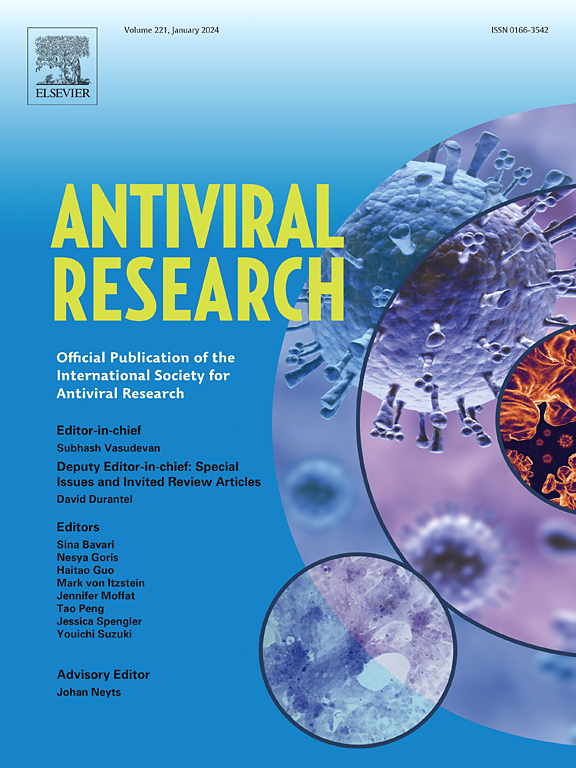小檗碱能促进与 K48 链接的 HNF4α 多泛素化,从而抑制 HBV 复制。
IF 4.5
2区 医学
Q1 PHARMACOLOGY & PHARMACY
引用次数: 0
摘要
目前用于治疗慢性乙型肝炎病毒(HBV)感染的抗病毒药物并不能完全清除患者体内的共价闭合环状 DNA(cccDNA)和整合病毒 DNA 片段。小檗碱是从多种植物中提取的一种异喹啉生物碱,据报道可抑制多种类型 DNA 的复制。在这项研究中,我们测试了小檗碱及其衍生物对 HBV 感染的影响。在所测试的化合物中,小檗碱抑制病毒核心启动子活性的水平最高,能抑制原代人类肝细胞和受 HBV 感染的 HepG2-NTCP 细胞中 HBV 的产生和 cccDNA 的合成,EC50 值为 3.6 μM,CC50 值超过 240.0 μM。与其他病毒启动子活性相比,小檗碱处理能有效下调核心启动子活性,降低肝核因子 4α (HNF4α)的蛋白水平,但不降低 RNA 水平,而 HNF4α 主要增强 II/核心启动子活性。此外,小檗碱处理增强了与 K48 链接的多泛素化,而不是与 K63 链接的多泛素化,以及随后蛋白酶体依赖性降解 HNF4α。这些结果表明,小檗碱能增强 HNF4α 的多泛素化和蛋白酶体依赖性降解,然后通过抑制核心启动子的活性抑制 HBV 复制。无论是否存在残留的cccDNA或整合的病毒DNA片段,开发基于小檗碱的抗病毒药物都可能有助于改善与HBV相关的疾病。本文章由计算机程序翻译,如有差异,请以英文原文为准。
Berberine promotes K48-linked polyubiquitination of HNF4α, leading to the inhibition of HBV replication
The current antiviral agents for the treatment of chronic infection with hepatitis B virus (HBV) do not completely remove covalently closed circular DNA (cccDNA) and integrated viral DNA fragments from patients. Berberine is an isoquinoline alkaloid extracted from various plants and has been reported to inhibit the replication of various types of DNA. In this study, we tested the effects of berberine and its derivatives on HBV infection. Berberine inhibited viral core promoter activity at the highest level among the compounds tested and suppressed HBV production and cccDNA synthesis in primary human hepatocytes and HBV-infected HepG2-NTCP cells at an EC50 value of 3.6 μM and a CC50 value of over 240.0 μM. Compared with other viral promoter activities, berberine treatment potently downregulated core promoter activity and reduced protein levels, but not RNA levels, of hepatic nuclear factor 4α (HNF4α), which primarily enhances enhancer II/core promoter activity. Furthermore, berberine treatment enhanced K48-linked, but not K63-linked, polyubiquitination and subsequent proteasome-dependent degradation of HNF4α. These results suggest that berberine enhances the polyubiquitination- and proteasome-dependent degradation of HNF4α and then inhibits HBV replication via the suppression of core promoter activity. The development of antiviral agents based on berberine may contribute to the amelioration of HBV-related disorders, regardless of the presence of residual cccDNA or integrated viral DNA fragments.
求助全文
通过发布文献求助,成功后即可免费获取论文全文。
去求助
来源期刊

Antiviral research
医学-病毒学
CiteScore
17.10
自引率
3.90%
发文量
157
审稿时长
34 days
期刊介绍:
Antiviral Research is a journal that focuses on various aspects of controlling viral infections in both humans and animals. It is a platform for publishing research reports, short communications, review articles, and commentaries. The journal covers a wide range of topics including antiviral drugs, antibodies, and host-response modifiers. These topics encompass their synthesis, in vitro and in vivo testing, as well as mechanisms of action. Additionally, the journal also publishes studies on the development of new or improved vaccines against viral infections in humans. It delves into assessing the safety of drugs and vaccines, tracking the evolution of drug or vaccine-resistant viruses, and developing effective countermeasures. Another area of interest includes the identification and validation of new drug targets. The journal further explores laboratory animal models of viral diseases, investigates the pathogenesis of viral diseases, and examines the mechanisms by which viruses avoid host immune responses.
 求助内容:
求助内容: 应助结果提醒方式:
应助结果提醒方式:


